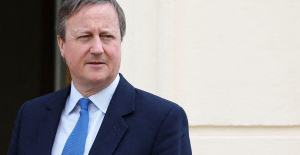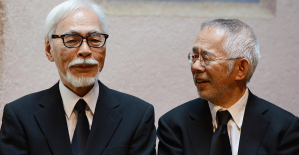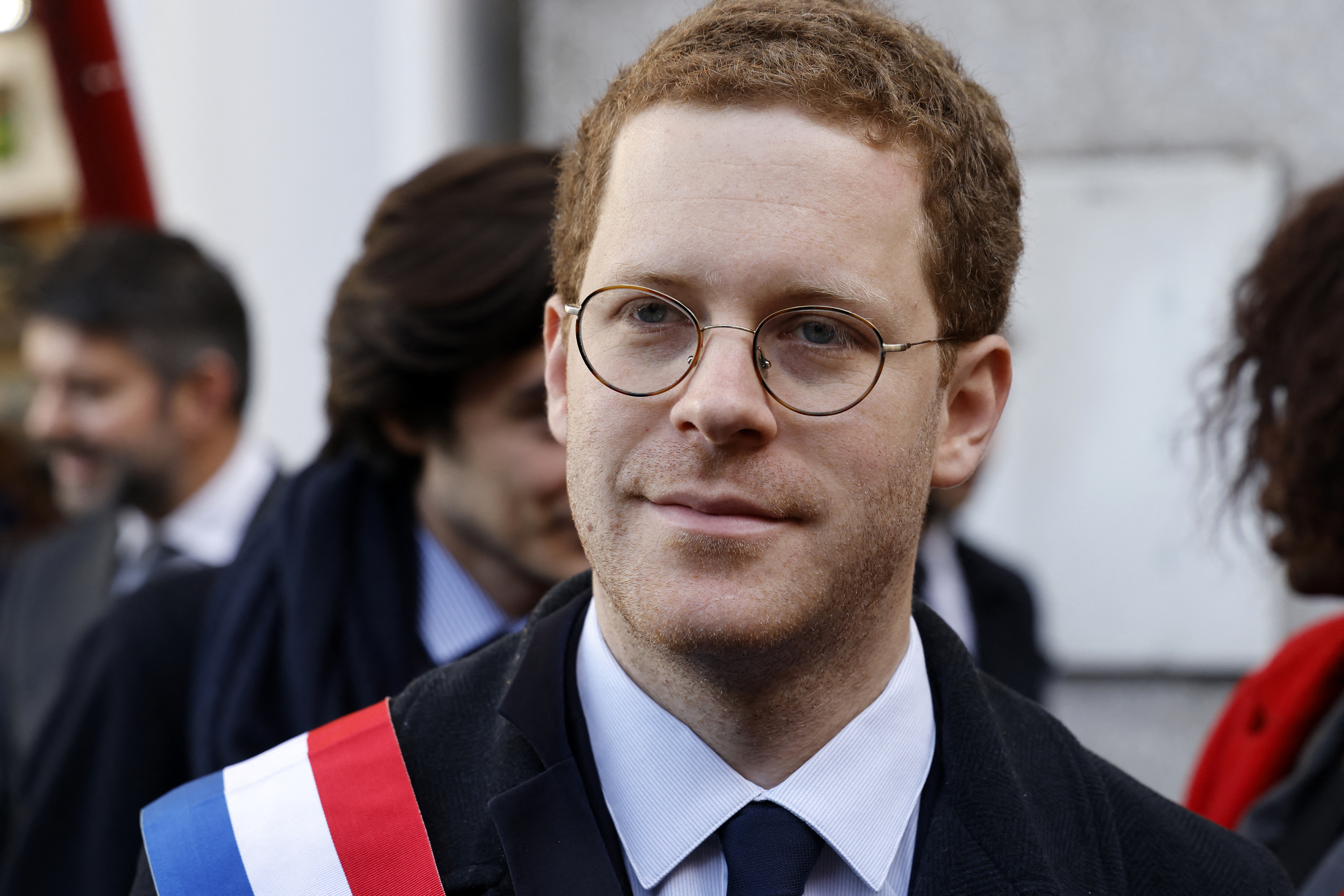The Israeli ex-Prime Minister Benjamin Netanyahu has shown himself confident of victory after the parliamentary elections. He is "close to a major victory" and will lead a right-wing government if the results of the post-election polls confirm it, Netanyahu told supporters of his Likud party in Jerusalem on Wednesday. The incumbent Prime Minister Jair Lapid, on the other hand, said he would wait and see. "Nothing has been decided" and his party will "wait patiently for the final results," Lapid said at a rally of his center-party Yesh Atid in Tel Aviv.
According to the post-election polls, longtime former Prime Minister Netanyahu has won the elections for the Israeli parliament and can hope for a right-wing government majority. Prime Minister Jair Lapid had to admit defeat.
Lapid's center-party Yesh Atid was second with 22 to 24 seats in parliament, according to forecasts by three Israeli television channels, behind Netanyahu's right-wing Likud party, which won 30 or 31 seats in the 120-seat parliament.
Together with his allies, an alliance of ultra-right and ultra-religious parties, Netanyahu would have a narrow majority in parliament with 61 to 62 seats. An absolute majority of 61 seats is required to form a government.
However, as previous Israeli elections have shown, slight discrepancies in the official vote count could change the outlook dramatically. Post-election polls may indicate a trend, Israel Democracy Institute research center director Johanan Plesner told AFP. In previous elections, however, there were discrepancies with the actual results.
When the final official result is known, President Izchak Herzog decides who will be given the task of forming a government. The candidate then has four weeks to form a coalition. Like last year's election, however, it could take weeks or months for a government to form. Netanyahu was initially given the task of forming a government, but was unable to forge a coalition.
The country on the Mediterranean Sea with nine million inhabitants has been in a permanent crisis for years. The past elections had often led to unclear majorities. The current parliamentary election is the fifth in three and a half years.
The current eight-party coalition led by Prime Minister Naftali Bennett collapsed in June after losing its majority after just 12 months. Foreign Minister Jair Lapid then took over the post of head of government. The extremely unusual alliance was supported by parties from the right to the left - an Arab party was also in government for the first time.
The opposition leader Netanyahu, accused of corruption, wants to return to the office of prime minister. The 73-year-old has been head of government in Israel several times, for a total of more than a decade and a half. Netanyahu is aiming to form an ultra-right religious coalition that could help him pass sentencing-evasion legislation.
The party landscape in Israel is highly fragmented and driven by interests. Even parties from similar camps are often not able to form alliances. In addition to differences in content, this is also due to personal disputes. In addition, there is a low percentage hurdle that has to be cleared to enter parliament. It is 3.25 percent, in Germany it is about 5.

 Rishi Sunak wants a tobacco-free UK
Rishi Sunak wants a tobacco-free UK In Africa, the number of millionaires will boom over the next ten years
In Africa, the number of millionaires will boom over the next ten years Iran's attack on Israel: these false, misleading images spreading on social networks
Iran's attack on Israel: these false, misleading images spreading on social networks Iran-Israel: David Cameron wants the G7 to impose “coordinated sanctions” on Iran
Iran-Israel: David Cameron wants the G7 to impose “coordinated sanctions” on Iran New generation mosquito nets prove much more effective against malaria
New generation mosquito nets prove much more effective against malaria Covid-19: everything you need to know about the new vaccination campaign which is starting
Covid-19: everything you need to know about the new vaccination campaign which is starting The best laptops of the moment boast artificial intelligence
The best laptops of the moment boast artificial intelligence Amazon invests 700 million in robotizing its warehouses in Europe
Amazon invests 700 million in robotizing its warehouses in Europe Solar panels: French manufacturer Systovi announces the cessation of its activities due to “Chinese dumping”
Solar panels: French manufacturer Systovi announces the cessation of its activities due to “Chinese dumping” Tesla: canceled in court, Musk's huge compensation plan will again be submitted to shareholders
Tesla: canceled in court, Musk's huge compensation plan will again be submitted to shareholders Two, three or a hundred euros: who are the most generous customers with tips?
Two, three or a hundred euros: who are the most generous customers with tips? Boeing safety examined in US Senate, after whistleblower's revelations
Boeing safety examined in US Senate, after whistleblower's revelations Immersion among the companions of the Liberation
Immersion among the companions of the Liberation Provence-Alpes-Côte d’Azur releases several hundred thousand euros for the promotion of the work of Marcel Pagnol
Provence-Alpes-Côte d’Azur releases several hundred thousand euros for the promotion of the work of Marcel Pagnol A palm of honor distinguishes Studios Ghibli for all of their work
A palm of honor distinguishes Studios Ghibli for all of their work Gaby, a new play by Pagnol adapted into a comic strip
Gaby, a new play by Pagnol adapted into a comic strip Skoda Kodiaq 2024: a 'beast' plug-in hybrid SUV
Skoda Kodiaq 2024: a 'beast' plug-in hybrid SUV Tesla launches a new Model Y with 600 km of autonomy at a "more accessible price"
Tesla launches a new Model Y with 600 km of autonomy at a "more accessible price" The 10 best-selling cars in March 2024 in Spain: sales fall due to Easter
The 10 best-selling cars in March 2024 in Spain: sales fall due to Easter A private jet company buys more than 100 flying cars
A private jet company buys more than 100 flying cars This is how housing prices have changed in Spain in the last decade
This is how housing prices have changed in Spain in the last decade The home mortgage firm drops 10% in January and interest soars to 3.46%
The home mortgage firm drops 10% in January and interest soars to 3.46% The jewel of the Rocío de Nagüeles urbanization: a dream villa in Marbella
The jewel of the Rocío de Nagüeles urbanization: a dream villa in Marbella Rental prices grow by 7.3% in February: where does it go up and where does it go down?
Rental prices grow by 7.3% in February: where does it go up and where does it go down? Europeans: the schedule of debates to follow between now and June 9
Europeans: the schedule of debates to follow between now and June 9 Europeans: “In France, there is a left and there is a right,” assures Bellamy
Europeans: “In France, there is a left and there is a right,” assures Bellamy During the night of the economy, the right points out the budgetary flaws of the macronie
During the night of the economy, the right points out the budgetary flaws of the macronie Europeans: Glucksmann denounces “Emmanuel Macron’s failure” in the face of Bardella’s success
Europeans: Glucksmann denounces “Emmanuel Macron’s failure” in the face of Bardella’s success These French cities that will boycott the World Cup in Qatar
These French cities that will boycott the World Cup in Qatar Union Bordeaux Bègles-Clermont: at what time and on which channel to follow the Top 14 clash?
Union Bordeaux Bègles-Clermont: at what time and on which channel to follow the Top 14 clash? Football: Ada Hegerberg extends at OL until 2027
Football: Ada Hegerberg extends at OL until 2027 Basketball: suspended for life from NBA for fixing his match
Basketball: suspended for life from NBA for fixing his match Paris 2024 Olympic Games: boxer Estelle Mossely wants to parade on the Seine as a flag bearer
Paris 2024 Olympic Games: boxer Estelle Mossely wants to parade on the Seine as a flag bearer


















